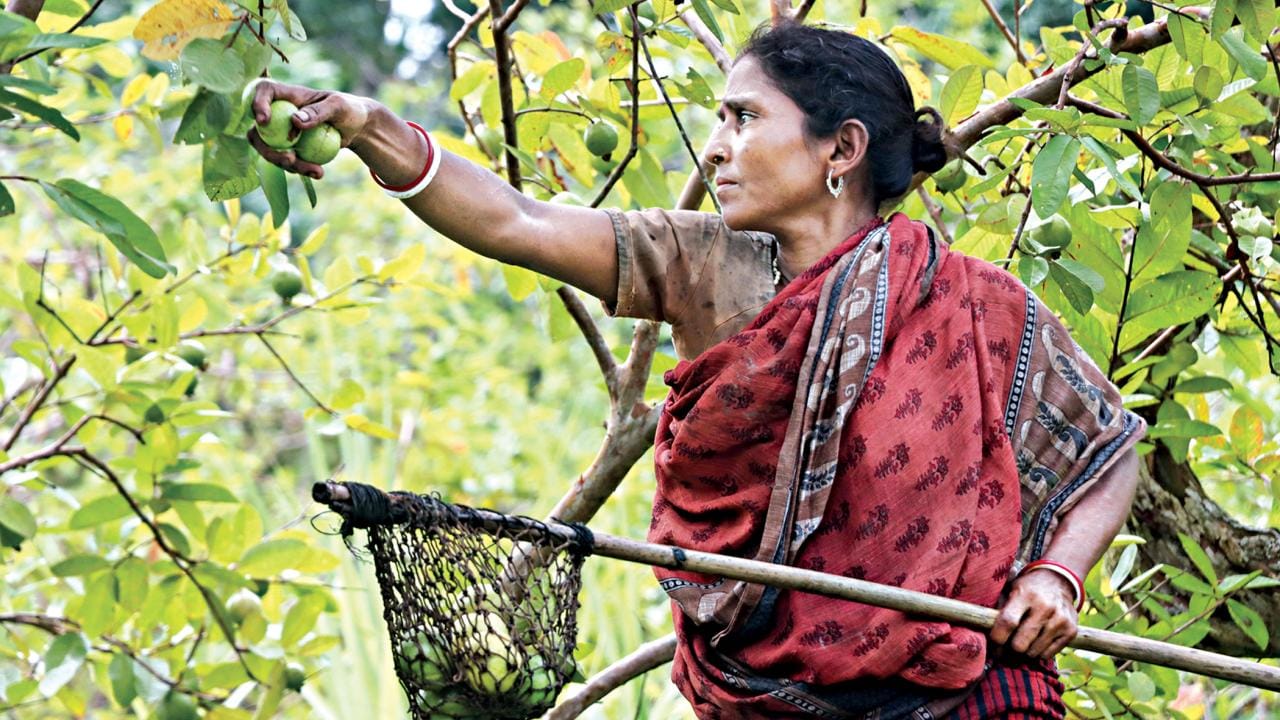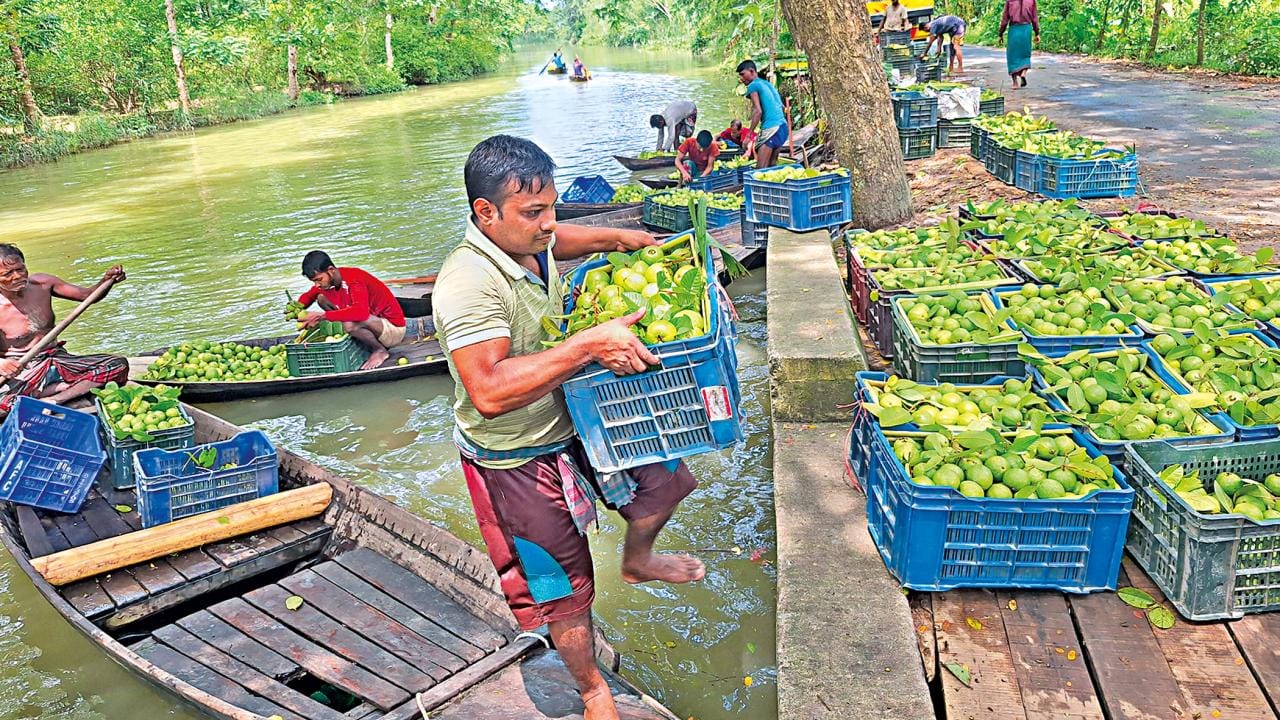A floating mosaic of guavas, baskets and people
Rain clouds hung low over the Bhimruli canal in Jhalakathi, casting a misty haze over the emerald landscape. But neither the damp air nor the morning drizzle could deter Pushpa Samaddar.
At 41, Pushpa stood at the edge of the water, ready to begin her daily journey into the guava orchards. With her were two children and her blind husband, Sumath Samaddar, seated quietly in a small dinghy boat.
With a determined face and weather-hardened arms, Pushpa rowed her family into the canal's green expanse. Her younger child clutched a small umbrella, shielding them from the drizzle.
Once among the trees, Pushpa climbed onto a guava branch with practised ease and began picking the day's harvest. When another boat approached, she smiled and called out to this correspondent, "Try it, these are the early guavas of the season. A little bitter, but good to eat."
Pushpa has known these orchards since childhood. Raised nearby in her father's house, she married Sumath two decades ago, and has since taken over every aspect of family life: rowing, harvesting, selling, and raising their three children.
"I leased this garden for Tk 15,000 this season," she said, still perched on the branch. "To manage the money, I took a loan from a local association. I'll have to pay back Tk 1,750 extra over the year."
Her workday begins at 4:30am. That day, the bad weather caused a delay, but she was undeterred. She packed guavas into a basket with practised hands, ready to sell them at Bhimruli market that evening.
From her guava earnings, Pushpa managed to marry off her eldest daughter, Pinky, four years ago. Her son-in-law now runs a guava business after leasing a bigha of orchard for Tk 17,000. Her son Sumon is in class five, and her younger daughter Sukanya studies in class three at a local school.

"My whole family depends on the guava season. The rest of the year, we grow vegetables and take on whatever work we can find," she said.
As the canal widened, dozens of boats came into view -- a floating mosaic of baskets, guavas, and people. Some carried tourists. Others were filled with women farmers, hard at work.
Minati Samaddar, 45, was seen rowing a small dinghy.
"My husband Nitai has breathing issues, so I'm taking care of our guava garden," she said. "He sells the guavas in the market."
Minati leased their orchard for Tk 10,000 this season, borrowing the sum with interest. Like many in the community, she carries this burden quietly.
Nitai's weary face tells of hard years. When he returns from market, it is often on an empty stomach.
During the monsoon, Jhalakathi transforms into a floating paradise. Bhimruli guava market comes alive with boats carrying farmers, buyers, and tourists.
By mid-morning, the air is thick with the scent of ripe guavas and the soft flapping of bat wings in the orchard trees. Boats glide past, their passengers bartering for fruit or soaking in the view.
Guava now sells for Tk 25 to Tk 30 per kg. But as the season peaks, prices plummet to as low as Tk 2 or 3 per kg.
Boats loaded with jackfruits, raw bananas, and lemons also head to Bhimruli Bazar. Nitai supplements his income by selling vegetables in city markets.
Asim Halder cultivates lemons alongside guavas. On this day, he brought 80 lemons to sell wholesale for Tk 80, a modest return, but enough to support his family.
Despite the picturesque setting, farmers are increasingly anxious.
"The guava season started late this year due to bad weather," said Khitish Halder of Kapurakathi village. "We sold for Tk 20 per kg at first. Now, traders from Dhaka and Chattogram offer Tk 800 per maund, but the price will drop soon."
He added, "During peak season, it goes down to Tk 5–8 per kg. This happens every year. If only we could preserve the guavas... jam or jelly production could really help."

Many echoed this sentiment, urging authorities to set up cold storage and processing plants to prevent wastage and stabilise prices.
Alongside farming, many locals have turned to tourism for extra income.
Anik, a boatman who also runs a tailoring shop, ferries tourists during the season.
"Hundreds of young people like me are earning from this," he said. "Soon, the market will be full, hotels and shops will get busy again."
A standout attraction is the "Boudir Floating Hotel," run by Sathi Roy for the past 20 years.
"We serve vegetables, local fish, chicken, and duck. During peak season, 200 to 300 people eat here daily," Sathi said, watching over steaming pots of fish curry.
Tourism in the guava belt is growing rapidly. Asaduzzaman, secretary of the local tour operator association, said around 5,000 visitors come daily during the season.
A group of tourists from Dhaka was seen enjoying lunch at Boudir Hotel after a boat tour.
But some feel the changes have come at a cost.
Apu Nazrul, a tour operator, posted online, "We've been coming here for 10 years, but now the serene atmosphere is disrupted by sound pollution. It's changing."
Still, many like Mizanur Rahman of Old Dhaka return each year. "The beauty of the orchards is unmatched," he said.
Currently, there are about 8–10 floating hotels, over 100 trawlers, and 20–25 tourist boats in Bhimruli. Boat rentals cost around Tk 300 per hour, while trawlers go for Tk 500.
According to locals, the region's guava variety dates back over two centuries, when a farmer named Purna Mandal brought the plant from Gaya, India. It became known locally as Purna Mandali.
But things are changing. Due to rapid ripening and lack of storage, many farmers are switching to hog plum and lemon, turning traditional orchards into mixed groves.
The Department of Agricultural Extension (DAE) says guava is grown on 2,718 hectares in the Barishal division, yielding 25,000 tonnes valued at around Tk 50 crore.
In Nesarabad upazila of Pirojpur, agriculture officer Mahafuzur Rahman said about 10,000 farmers are involved in cultivating guava, hog plum, and lemon.

"Guava is decreasing; hog plum is increasing," he confirmed.
Jhalakathi Sadar is the region's second-largest guava producer. Major floating wholesale points include Bhimruli, Kirtipasha, Shatdashkathi, Khajuria, Dumuria, Kadakati, Jagadishpur, Kuriana, and Rayerhat.
But yields are falling due to ageing orchards.
"We're encouraging cultivation of the Bari variety," said Najrul Islam Sikder, additional director of DAE. "But farmers prefer local guavas. We're also planning jam and jelly processing projects."
Dilip Sikder, a veteran farmer in Nesarabad, said cold storage and processing plants could change everything.
"There's still a lot of guavas here," he said. "At least 50,000 farmers could benefit if preservation facilities were available."
Farmers also called for low-interest loans, as many rely on private lenders who charge high interest.
As the sun climbed over Bhimruli, the boats drifted quietly across the water. Women like Pushpa and Minati rowed forward, baskets full of fruit, hearts full of resilience.
The guava season in Jhalakathi is more than a harvest -- it is a portrait of survival, tradition, and quiet heroism.




 For all latest news, follow The Daily Star's Google News channel.
For all latest news, follow The Daily Star's Google News channel.
Comments